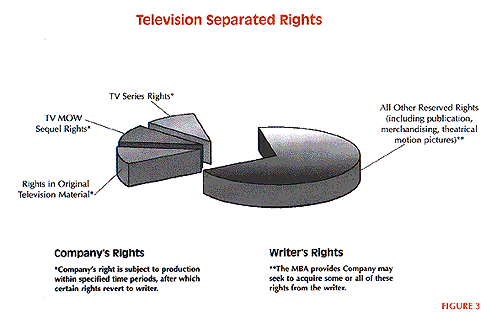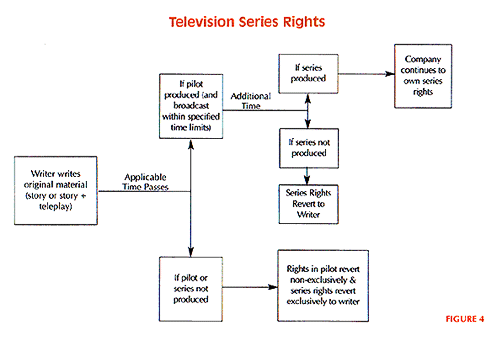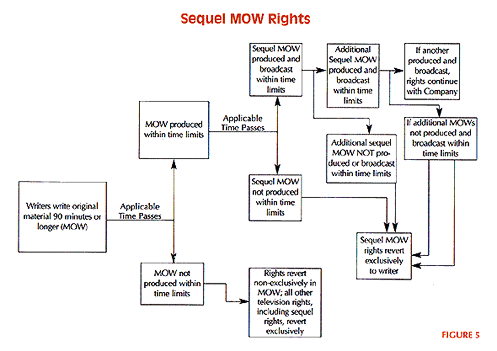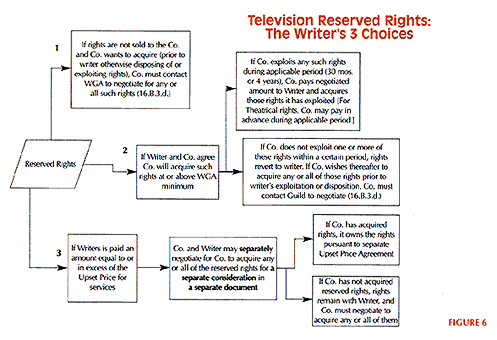Understanding Separated Rights
Television Separated Rights
1. WHO IS ENTITLED TO TELEVISION SEPARATED RIGHTS?
On a television movie, the writer who receives "Story by" or "Written by" credit on the program, and, in certain circumstances, "Television Story by," is entitled to Separated Rights. This is determined through the regular credit determination process. (Article 16.B.1.a.)
In the case of an episodic series, the writer who receives "Created by" credit on the series, as determined by the WGA, is entitled to Separated Rights. (See DETERMINING SEPARATED RIGHTS ON A TELEVISION SERIES below.)
Generally, if the series or film is based on source material (e.g., a book or a play), there are no Separated Rights. Some of the exceptions to this general rule are if the source material is factual or the writer has written a substantially new and different story from the underlying material and is entitled to "Television Story by" credit. (Article 16.B.1.b.)
2. WHAT ARE THE TELEVISION SEPARATED RIGHTS?
For original television material,10 there are two categories of rights, each with its own rules and requirements: (1) television rights and (2) all other, otherwise known as "reserved rights." (Article 16.B.2. and Article 16.B.3.) [Figure 3]

a. Television Rights
(1) Rights in the Original Television Material: When the writer is employed to write an original story (or story and teleplay), or sells original material as a professional writer, the Company has a specified period of time within which it has the exclusive right to produce the material. The material may be a pilot, a Movie of the Week ("MOW")11, or part of an anthology program. The Company generally holds the exclusive right for a period of 4 years from the delivery of the original writer's material.12 For material intended for programs 60 minutes or less, or for topical material (a subject matter of timely interest), that time may be reduced to 30 months following delivery of the material if the material is not in active development at that 30 month mark.
After the Company's period of exclusivity, the writer and the Company share a non-exclusive right to produce the material. This means that both the writer and the Company have the right to produce the property without further obligation to the other, although the Company must still comply with the writer's contract and the MBA. (Article 16.B.2.) It is advised that the writer notify the Company of the intention to exploit the non-exclusive rights.
Beginning with the 1985 MBA, the writer has the right to buy back the Company's non-exclusive right in order to gain exclusivity in the material. The writer may do this by paying back to the Company what was paid the writer. The writer is not obligated to pay any other charges. In addition, the writer must obligate the new production Company to pay any other costs directly attributable to the literary material out of the first revenue after production costs have been recovered. (Article 16.B.2.a.)
(2) Second Pilot: The Company may produce a second pilot during the period it has exclusive rights (either the 30 months or 4 years). If the Company produces a second pilot, it must make a deal with the writer of the first pilot for compensation not less than that paid the writer for the first pilot and in no event less than the current minimum. (Article 16.B.2.a.)
(3) Series Rights: [Figure 4] In addition to the television rights in the original material, the Company has the exclusive right to produce a series based on the original material for the same period described above. This means that the Company must have a commitment to produce and broadcast at least a "short order" of episodes within these time limits. In addition, if the original MOW or pilot is broadcast within three years after delivery of the original material, the Company's exclusive right to produce a series extends to three years from the date of broadcast. If the Company chooses to produce a second pilot, the period of the Company's exclusive right to produce a series is the earlier of four years from delivery of the original material or three years from release of the second pilot.

If the Company produces a series within the time frames outlined above, the Company owns the series rights.13 The writers who have Separated Rights are entitled to "sequel payments" for each episode of the series produced as well as residuals on those payments.
If the Company does not produce a series within the time frames outlined above, the sequel rights revert exclusively to the writer. Therefore, after the expiration of the time limits, the writer may sell the series rights to another Company, without any payment to the first Company, even if the first Company has produced a pilot.
In some instances, the writer may write a format or a "bible" for a television program.14 Rights in an unproduced format revert to the writer within 18 months after delivery of the material and rights in an unproduced bible revert to the writer within 24 months, unless the Company has employed another writer to write a story and teleplay based on the format or bible. Certain monies must be paid back to the Company if the format is sold and the series is produced. (Article 16.B.2.a.)
(4) Sequel MOWs: [Figure 5] The rights regarding single sequels to MOWs are very different than for series. These rights generally apply to original material and single production sequels of 90 minutes or more. The writer of the original MOW must be offered the opportunity to write the sequel and there are minimum sequel payments due the writer for each sequel MOW produced.

The Company must produce and broadcast sequels within specified periods of time. Each additional sequel extends the Company's right to produce another MOW. If any of the particular timeframes for sequel MOWs are not met, the right to produce additional sequels reverts exclusively to the writer. (Article 16.B.2.b.)
(5) Mandatory Rewrite: When a professional writer sells or options original material 90 minutes or longer, the Company must offer the writer the right to perform the first rewrite at not less than minimum, unless time constraints make that impractical. The writer may waive this right but such waiver must be negotiated as part of the deal rather than appear as part of boilerplate language in the Company's form contracts. (Articles 16.B.3.h. and i.)
In addition, if the Company contemplates replacing the original writer, a representative of the Company is obligated to meet with the writer, which gives the writer an opportunity to discuss staying on the project. (Article 16.B.3.h.)
b. Reserved Rights
Other than those television rights described above, the writer owns all other rights in and to the material. (Article 16.B.3.) The "reserved rights" include the following:
(1) Dramatic stage rights: The right to produce a stage version based upon the material.
(2) Theatrical rights: The right to produce a theatrical motion picture based upon the material.
(3) Publication rights: The right to publish a book based upon the material or to publish the script.
(4) Merchandising rights: The right to manufacture and sell merchandise based upon the material.
(5) Radio rights: The right to produce a radio program based upon the material.
(6) Live television rights: The right to produce a live television program based upon the material.
(7) Interactive Rights: The right to produce interactive programs based upon the material.
(8) All other rights: Other rights now known or known in the future.15
The Company and writer may negotiate for the Company to acquire some or all of the reserved rights. The MBA provides minimums for theatrical, publication, interactive, and merchandising rights. For example, the minimum for the merchandising rights is 6% of the monies paid by the manufacturer for the right to merchandise. However, if the Company does not exploit any of these rights within four years from the delivery of the literary material or three years from the exhibition of the original project, those rights revert to the writer, subject to the Company's limited right of first negotiation. (Article 16.B.3.d.)
Alternatively, if the writer is paid initial compensation in an amount equal to, or in excess of, the "upset price,"16 the Company and the writer may negotiate freely for the Company to acquire all or some of the reserved rights outright." NOTE: The reserved rights must be acquired by the Company in a separate negotiation, in a separate document, and for a separate consideration. (Article 16.B.5.) [Figure 6]

3. WHAT HAPPENS WHEN WRITERS SHARE SEPARATED RIGHTS?
As writers may share the qualifying "Written by," "Story by," or "Television Story by" credit, they may also share the Separated Rights which flow from that credit.
A team of writers,17 designated with an "&," is considered a single writer and the team members must decide how the rights will be exploited and which of them, if either, will be authorized to exploit the rights on behalf of the team. A written collaboration or partnership agreement is recommended to address these issues before problems arise.
When writers writing separately (i.e., not a team) share the qualifying credit, each writer shares in the rights to the entire story and screenplay. For example, if two writers share "Story by" credit, neither writer owns exclusive rights in what s/he wrote alone. The writers share the rights to the whole property, and, therefore, reserved rights must be exploited jointly. (Article 16.B.1.a)
4. WHAT HAPPENS WHEN THERE ARE NO SEPARATED RIGHTS?
If there are no Separated Rights in a series, the credited writer(s) of the pilot is paid 75% of the otherwise due sequel payments, but no residuals. This is known as the ADAPTOR'S ROYALTY. (Article 16.B.6.) The writer may also negotiate for a "Developed by" credit, which is not subject to an automatic credit arbitration.
5. ARE THERE SEPARATED RIGHTS IN A TRUE-LIFE STORY?
A writer may be entitled to Separated Rights in a true-life story, depending on what the Company has assigned to the writer.
If the Company gave the writer a specific underlying work on which to base a teleplay with the instructions to follow the structure and point of view of that underlying work, it is likely the writer has not created an original story and would not qualify for Separated Rights.
On the other hand, the Company may give the writer a subject matter (e.g., a real person), and some biographical material, and the writer must determine what story to tell, how to tell it, what tone and point of view to use, and is otherwise given a great deal of discretion so as to create an "original" story. The Separated Rights, if any, would be in the material by the writer, including any new and different characters, characterizations and events. The writer would not gain rights in an individual's life for example; those would need to be acquired separately. (Article 16.B.3.g.)
In short, in order to protect a writer's separated rights, it is important to establish what material the Company owns, what specific material is assigned to the writer, and to keep a detailed record of all instructions given the writer.
10 "Original material" in this instance is that which is not based on material previously published or exploited or not based on material written outside of WGA jurisdiction.
11 Long Form television motion pictures were historically called "Movies of the Week" because of their broadcast pattern. More recently, they have been called "Movies for Television" ("MFTs"). The terms are synonymous.
12 To calculate the correct time period, use the date of the original writer's last writing.
13 This includes single programs longer than the typical episode of the series and which are produced separate in time from the production of the rest of the series. (For example, a 2 hour Dallas MOW.)14 The MBA defines a format as follows: "as to a serial or episodic series, such format sets forth the framework within which the central running characters will operate and which framework is intended to be repeated in each episode; the setting, theme, premise, or general story line of the proposed serial or episodic series; and the central running characters which are distinct and identifiable, including detailed characterizations and the interplay of such characters. It may also include one or more suggested story lines for individual episodes." The format for a miniseries is called a "bible." (Article 1.C.19.)X15 These rights are obviously complex. A writer who wishes to exploit any of these rights should first contact the WGA Contracts Department at 323/782-4501. A copy of the writer's contract will also be necessary.
16 The "upset price" is an amount of money, significantly in excess of minimum, set forth in the MBA, that a Company can pay at the time of the original employment or purchase agreement. That allows the Company to negotiate directly with the writer to purchase all or some of the reserved rights. The purchase price for the reserved rights is commissionable.
17 The MBA defines a team as two writers who, prior to employment, offer to work together for approximately the same length of time on the same material. The MBA does not permit more than two writers to work as a team unless the WGA has granted a waiver prior to the commencement of writing services.
